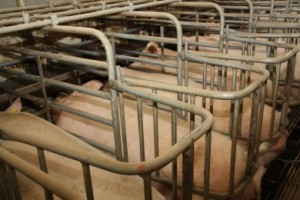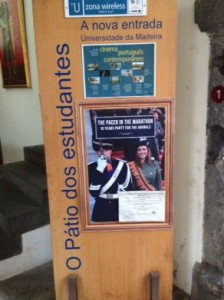Worldlog Semana 4 – 2014
Quiero que el consejo de ministros ponga freno al desarrollo de establos laboratorios. Estos establos cerrados y climatizados donde los ganaderos se visten completamente de plástico estéril y donde no está permitido entrar, no son de ninguna forma una solución de para el problema del antibiótico. (La industria ganadera pretende que sí.)
Desafortunadamente, la secretaria del estado Dijksma sigue dándoles la libertad de elección a los ganaderos y veterinarios para elegir sus propias medidas para la disminución del uso de antibióticos. Esto llevará al desarrollo de establos estériles muy alejados de las circunstancias de vida naturales del animal.
La bioindustria es literalmente patógena. La antinatural manera de vivir de los animales en establos herméticamente cerrados les causa enfermedades como neumonía, trastornos de pezuña y respiratorios. La ganadería neerlandesa usa tantísimos antibióticos que los agentes patógenos se hacen resistentes. Esta llamada resistencia de antibióticos conlleva riesgos mortales para el hombre y los animales. ¡Hay que frenarlo!
The New York Times ahora también ha señalado la creciente consciencia mundial sobre la injusticia que le cometemos con los animales.
Se ha manifestado otro escándalo de carne en los Países Bajos. Ha llegado en las noticias extranjeras.
Como os conté la semana pasada, pasé el fin de semana del 11. de enero en Madeira (Portugal) con nuestro partido hermano PAN (Partido para los Animales y para la Naturaleza). La gente del PAN me contó sobre la consciencia portuguesa alrededor del sufrimiento animal, que está creciendo enormemente. Me ha encantado encontrarme con gran número de neerlandeses que habían venido desde el Algarve y del norte de Portugal, especialmente para este mitin. En el restaurante Jardim das Cerejas comí una deliciosa comida vegana.
En Madeira hay una naturaleza vulnerable y cada vez hay más gente queriendo proteger esa naturaleza contra los abundantes planes de construcción. En el precioso antiguo edificio de la Universidad de Madeira tuvo lugar la representación de nuestra película El que marca el paso del maratón. A propósito; el Partido para los Animales de Madeira participa en la coalición de la capital de Funchal.
Nuestra película sobre los diez años de existencia del Partido para los Animales, El que marca el paso del maratón, ha sido seleccionada de nuevo, para diversos festivales internacionales. ¡Súper! Seguro es que El que marca el paso del maratón será representada en dos festivales en febrero en Florida (EEUU) y Gainesville (California, EEUU). Así mismo, el documental será estrenado en 2014 en las tres ciudades inglesas Brighton, Bristol y Londres, y todo esto a través del festival inglés VegFest.
A través de Twitter recibo unas fotos preciosas. Esta extraordinaria amistad al animal no os quiero negar. Ni esta historia sobre la ballena solitaria tampoco. Es conmovedora.
Google recordó mundialmente el 82. cumpleaños de Dian Fossey. Dian Fossey era una investigadora estadounidense que observaba los gorilas en Ruanda durante años. Escribió el libro Gorrillas in the Mist, del cual se hizo una película. Pincha aquí para ver imágenes de esta mujer extraordinaria.
Steve Cutts ha hecho una animación impactante representando su opinión sobre la fanática cazadora estadounidense Melissa Bachman. Pulsa aquí para ver What a hunt.
Comenzamos esta semana con la primera traducción de mi Worldlog al árabe. Presentemente, el Worldlog está siendo leído en 11 idiomas. ¡Esperemos a que rápidamente sean más!
Hasta pronto,
Marianne
I want the government to stop the development of laboratory stables. These closed off, climate controlled stables, where livestock breeders cover themselves from top to toe in sterile plastic and which no one is allowed to enter, are far from a solution to the Antibiotic Problem (as is argued by the livestock industry).
State Secretary Dijksma for Economic Affairs still gives livestock breeders and vets the freedom to choose which measures they want to take to reduce the use of antibiotics. This has led to the development of sterile stables , where the living conditions of livestock retreat even further from the natural requirements of livestock.
Factory farming is literally sick making. The unnatural way in which animals live in almost locked stables causes animals to catch diseases, such as pneumonia, claw disorders and breathing problems. The great amount of antibiotics used at Dutch livestock farms has caused pathogens to become immune. Antibiotics resistance causes life-threathening risks for humans and animals. It must be stopped!
The New York Times has signalled a growing awareness worldwide of the injustice that we cause to animals.
The following meat scandal has manifested in the Netherlands. This is also news outside the borders of the Netherlands.
During the weekend of 11 January, I stayed in Portugal and on Madeira, as I told you last week, and visited our sister party PAN. The people of PAN told me that the awareness of what harm we do to animals is increasingly growing in Portugal. It was nice to meet the significant number of Dutch people that had come to the meeting especially from the North of Portugal and the Algarve. I had a delicious vegan meal in the restaurant Jardim das Cerejas.
Madeira has vulnerable nature and more and more people wish to protect that nature against many building plans. Our film The Pacer in the Marathon was shown in the University of Madeira, a beautiful old building. The Party for the Animals on Madeira forms part of the coalition government in the capital Funchal.
Our film about ten years of the Party for the Animals, The Pacer in the Marathon, was again selected for various international festivals. Brilliant! The Pacer in the Marathon will in any way be shown at two festivals in February in the United States: in Florida and in Gainesville, California. The film will also be shown in three cities during the English VegFest UK; in Brighton, Bristol and London.
I regularly receive beautiful pictures on Twitter. I would like to share these unusual animal friendships with you. And this story too about the lonely whale can be called moving.
Last week, Google commemorated the 82nd birthday of Dian Fossey. Dian Fossey was a researcher from the United States , who observed gorillas in Rwanda for years. She wrote the book Gorillas in the Mist, which was later turned into a film. See pictures of this special lady here.
Steve Cutts created a very fascinating animation to make his vision on the American hunting fanatic Melissa Bachman known. See What a hunt here!
This week the first Arabic translation of my Worldlog will be published. The Worldlog can be read in 11 languages already. Hopefully this will be more soon.
See you soon,
Marianne

